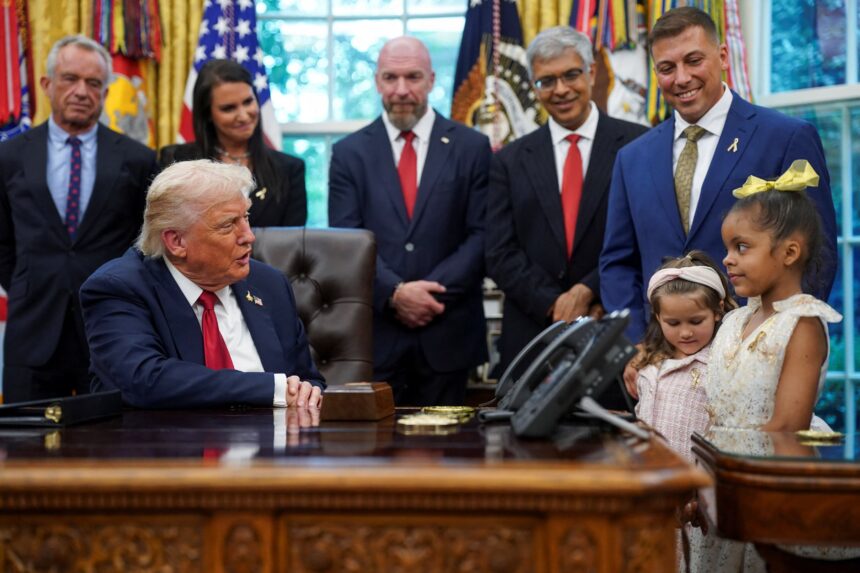President Donald Trump has signed an executive order that brings artificial intelligence (AI) into the fight against childhood cancer. The order pledges $50 million (€43 million) in new funding for the Childhood Cancer Data Initiative (CCDI). This program was launched during Trump’s first term. This move doubles the National Institutes of Health (NIH)’s commitment to $100 million. It aims to harness AI for better diagnoses, faster clinical trials, and more effective prevention.
What’s Happening & Why This Matters
AI Meets Pediatric Cancer
Trump framed the order as a breakthrough moment: “We’re going to hook up the artificial intelligence with all of the other things that we have at hand… And we’re going to come for answers.” He spoke while surrounded by young cancer survivors, promising: “You’re all going to be better very soon.”
The White House has not confirmed which companies or technologies will contribute. However, Trump hinted the tools would eventually be accessible nationwide: “It’s gonna be so accessible to everybody.”
The Stakes of Pediatric Cancer and Controversial Context
While rare, childhood cancer is devastating. According to the American Cancer Society, an estimated 9,550 children in the U.S. will be diagnosed with cancer in 2025. Globally, the World Health Organization (WHO) reports around 400,000 children and adolescents under 19 face cancer diagnoses each year.

Mortality rates have improved — falling by more than 50% since 1975. However, incidence rates have increased steadily since the 1970s. Pediatric cancer research also lags behind in funding. It makes up less than 10% of the federal cancer research budget, per the Children’s Cancer Foundation.
The new funding is welcome, but it contrasts with Trump’s history of cutting federal science budgets. In recent years, hundreds of scientists were removed from the payroll. Moreover, several hundred million dollars in grants — including pediatric cancer studies — were cancelled. The Pediatric Brain Tumor Consortium lost federal support earlier this year. This network has provided experimental treatments for 25 years.
The American Cancer Society Cancer Action Network warned: the broader proposed cuts “will set this nation back dramatically in our ability to reduce death and suffering.” Critics argue that while the EO makes headlines, the bigger picture of shrinking federal support raises tough questions. These concern the long-term impact.
TF Summary: What’s Next
Trump’s executive order injects new energy — and AI-powered optimism — into the fight against childhood cancer. By doubling CCDI funding, it promises advanced data analysis that could speed treatments and improve survival rates. Yet, ongoing cuts to broader science programs could undermine this progress if sustained investment is not guaranteed.
MY FORECAST: Expect AI-driven tools in pediatric research to gain traction quickly, especially in diagnostics and clinical trial matching. However, unless federal funding becomes more consistent, private and nonprofit organizations may need to step in. They may need to close gaps left by policy volatility.
— Text-to-Speech (TTS) provided by gspeech


